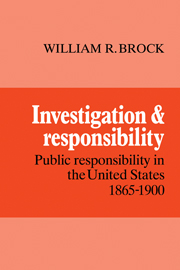Book contents
- Frontmatter
- Contents
- Dedication
- Preface
- 1 Public responsibility
- 2 Theory and practice
- 3 Public responsibility and the law
- 4 The charities of the State
- 5 The boards of public health
- 6 The bureaus of labor statistics
- 7 The railroad commissions
- 8 Toward the future
- Appendix 1 State agencies: some representative samples
- Appendix 2 Checklist of reports issued by boards of state charities, boards of public health, bureaus of labor statistics, and railroad commissions, 1865–1900
- Essay on sources and historiography
- Bibliography
- Index
3 - Public responsibility and the law
Published online by Cambridge University Press: 03 May 2010
- Frontmatter
- Contents
- Dedication
- Preface
- 1 Public responsibility
- 2 Theory and practice
- 3 Public responsibility and the law
- 4 The charities of the State
- 5 The boards of public health
- 6 The bureaus of labor statistics
- 7 The railroad commissions
- 8 Toward the future
- Appendix 1 State agencies: some representative samples
- Appendix 2 Checklist of reports issued by boards of state charities, boards of public health, bureaus of labor statistics, and railroad commissions, 1865–1900
- Essay on sources and historiography
- Bibliography
- Index
Summary
The principle that private property could be regulated when this was demanded by the public interest, or expropriated when it was required for public use, had deep roots in Anglo-American law. From time out of mind markets had been controlled, obligations had been imposed on common carriers, entry into some occupations had been restricted, while others required applicants to obtain licenses, individuals might be excluded from some trade because exclusive privileges had been given by law to corporations, and when health or safety was at risk summary action without prior application to the courts was justified. Anything that threatened health, imposed unreasonable inconvenience upon others, or was simply noxious could be declared a “nuisance” and its removal ordered. Equally drastic remedies might be applied to any activity which had immoral consequences. It was generally assumed that public responsibility for roads, bridges, and navigable water existed and could be exercised in numerous ways. In American law this great reserve of power was usually known as the “police power”; and, except on federal property, its exercise was the exclusive responsibility of the states. There was also the right of eminent domain, which gave state legislatures the right to take private property for public use, provided that fair compensation was given.
A classic statement of these principles is found in Chancellor Kent's Commentaries on American Law, and a new edition, edited by Oliver Wendell Holmes Jr, was published in 1873.
- Type
- Chapter
- Information
- Investigation and ResponsibilityPublic Responsibility in the United States, 1865–1900, pp. 58 - 87Publisher: Cambridge University PressPrint publication year: 1984



